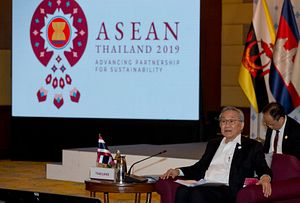Last week, Thailand’s foreign minister paid a visit to Russia. Though the scheduled interaction was just one of many between the two sides, it nonetheless highlighted the ongoing activity between them in the defense realm.
As I have noted before in these pages, while Thai-Russian defense collaboration is hardly new – Thailand, a U.S. treaty ally, has never entirely shied away from fostering ties with other powers, including in the defense realm – cooperation between Moscow and Bangkok has been on the uptick in recent years. Though collaboration has in some cases been slow to manifest if at all, there have been noticeable gains as well, including the inking of a military-technical cooperation agreement or deals on defense equipment.
That has continued on over the past year or so. Late last year, in one of the higher-profile developments in defense ties, there was a display of Russian helicopters in Thailand as part of Moscow’s ongoing series of presentations, demonstrations, and related events on defense-related equipment in the region. The trend was expected to continue into 2019 as well, both because of the more general logic of collaboration for both sides as well as other developments such as Thailand’s holding of the ASEAN chair this year.
Last week, the defense aspect of the bilateral relationship was in the headlines again with the visit of Thai Foreign Minister Don Pramudwinai to Russia. The foreign minister was on a scheduled trip to Moscow from February 7-8 amid a busy time for Bangkok both in terms of foreign policy and domestic politics as the country nears elections expected next month.
The Thai foreign minister’s visit included a series of interactions. He met with Russian officials including Russian Foreign Minister Sergei Lavrov and Minister of Industry and Trade Denis Manturov, who also co-chairs the Joint Commission on Bilateral Cooperation between the two countries.
The Thai foreign minister’s characterization of the agenda ahead of the trip suggested that it was wide-ranging. This included bilateral diplomatic cooperation between them and multilateral fora, embodied in the plan of consultations between the two foreign ministries that was signed during the visit, as well as economic and business issues as evidenced by the composition of the delegation that had representatives from Thailand’s Eastern Economic Corridor office and exporters.
Interestingly, the Russian account of the trip also emphasized that defense and security issues were covered as well. Following the meetings, Lavrov said that the two sides had agreed to develop defense and military technical cooperation and to improve their readiness to deepen cooperation against new challenges and threats.
Unsurprisingly, not much in the way of specifics was provided by either of the two sides in terms of whether anything specific had been agreed – such as items discussed on defense equipment and the potential opening of a maintenance center – and to what extent any of this amounted to new collaboration. Those indications may surface in more defense-specific interactions, and are worth looking out for to assess to what extent this rhetoric is actually being translated into reality.

































